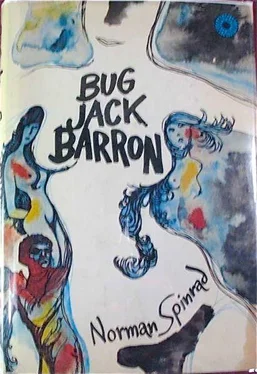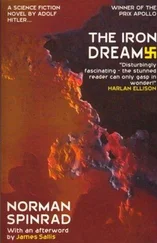“Don’t see how anyone could object to that,” Barron said. “But it seems to me you could say that real simple-like. So why’s your bill in so much trouble, Mr Howards, why all the static in Congress? Know what I think your trouble, is Mr Howards?”
“Suppose you tell me, Barren,” Howards said guardedly. Yeah, that seemed like a harmless lead-in, Bennie, but you know it wasn’t in your little script. And he foot-signaled Vince to give him a commercial in five minutes. Timing here had to be just right.
“Why, I think it’s just screwed-up semantics, is all,” Barron said, so sweetly innocent that Howards knew he was being sarcastic, and fear crept into his image-eyes, but it was all too subtle, inside stuff, for the audience to pick up on it yet, Barron knew. Which abruptly reminded him that there was a hundred-million Brackett Count audience digging the whole scene, out there on the other side of the screen.
“What do you mean by that?” Howards snapped, and Barron recognized it as a slipping of control.
He smiled blandly. “Your bill’s in trouble ’cause it’s badly written, is all. So long and complicated for something that’s supposed to be so straightforward and simple… all those funny little clauses, twisty and turny like a snake. Pretty hard to figure out what it all means.”
He pulled a blank sheaf of papers out of a pocket. (The old Joe McCarthy schtick.) “Tell you what,” he said, waving the papers across the monitor screen at Howards’ now-uptight image, “why don’t we clear it all up right now, straight from the horse’s mouth, you can explain the confusing parts to a hundred million Americans, right now, Mr Howards, and who knows, then maybe your simple little bill’ll go right through. Soon as we hack away all the confusing underbrush, dig?”
He put a razor in the last word, signaled to Vince to give him three-quarters screen, and zingo, Howards was a scared little twerp cowering below him in the hotseat. He suddenly realized that to the hundred million people on the other side of the screen, what they saw there was reality, reality that was realer than real because a whole country was sharing the direct sensory experience; it was history taking place right before their eyes, albeit non-event history that existed only on the screen. A strange chill went through him as for the first time he got a full gut-reality flash of the unprecedented power wielded by his image on the screen.
And like an internal neural time-sense circuit, the promptboard told him: “4 Minutes.”
He hardened that image to a mask of inquisitor-iron, yet spoke blandly, innocently, creating a gestalt of impending dread in the contrast. “Now lessee… this bill would set up a five-member regulating commission, appointed and holding office at ‘the pleasure of the President’. That’s a funny set-up, isn’t it? Seems like the commission would be totally controlled by the President if he could hire and fire commissioners whenever he pleased…”
“Freezing’s a very delicate problem,” Howards said defensively, like a boy caught with his hand in the old cookie jar. “If the commissioners had fixed terms, they might make mistakes that couldn’t be corrected for years. And in this case, time means human life.”
“And, of course, the Foundation for Human Immortality is very concerned with… human life,” Barron said as the promptboard flashed “3 Minutes.” “Now there’s another bit of funny language in here. The part that gives the Freezing Commission full power to ‘regulate, oversee, and pass on the appropriateness of all current operations of the Foundation for Human Immortality and any further operations in the area of life-extension as the Foundation may in the future undertake.’ If you translate that into English, it seems to mean that the commission would operate independent of Congress, in effect making its own law in the area of… life-extension.”
“Well… ah, doesn’t that answer your first question?” Howards said shrewdly, trying to tread water. “Congress just moves too slowly. Say… say we developed an immortality treatment; it could be years before Congress approved it, and in the meantime people would be dying who didn’t have to die. A commission could act at once. Sure, that’s a lot of power to entrust to appointed officials—and that’s why the President must be able to hire and fire commissioners at will, to keep the commission responsive to… public opinion. It may seem complicated, but it’s all very necessary.”
It sure as shit is, Barron thought. That’s where the whole schmear’s at—the bill’s a license for the Foundation to do anything, so long as the President plays ball. And Bennie figures on owning the next President, and he can do it too, and if not this time, then the next time round. One thing he’s got plenty of is time. Gets his bill through, and his flunky in the White House, he can have… killing children made legal somehow, or have his tame commission insist he’s not doing it. Time to show the fucker the razor inside.
“In other words, Howards, you and the President’ll run the whole show. The Foundation will control all freezing and… life extension, and only the President, comes nitty-gritty, can tell you what you can and can’t do.”
Howards’ image glared at him like a rat in a trap, and the paranoia within began to leak out through his eyes.
“The President…” Howards practically gibbered, “what’s wrong with that? Don’t you—”
“I wonder if it’s smart to trust all that to one man, even the President,” Barron said as the promptboard flashed “2 Minutes.” “I mean, one man, even a President, could be bought. With all your money, and maybe… something more? ”
“You’re crazy, Barron!” Howards shrieked, blowing all cool, his eyes becoming really rabid. “You’re slandering the President of the United States!”
“Who, me?” said Barron, signaling Vince to cut Howards’ audio, and give Howards three-quarters screen. “Why, I’m a regular pussycat, I wouldn’t slander anyone. I’m talking about a hypothetical President in a hypothetical situation, so all I gotta worry about is a hypothetical lawsuit, right?” Howards’ face was a mute backdrop of paranoia surrounding his on the monitor screen.
“So let’s just take a farfetched blue-sky hypothetical situation,” he said, foot-signaling to Vince to give Howards full screen. “Let’s say the Foundation for Human Immortality finally develops an immortality treatment…”
A feral twitch of pure terror spasmed Howards’ face for the hundred-million Brackett Count audience to see, as Barron called for full screen for himself and the promptboard flashed “90 Seconds.”
“Let’s say our little story takes place after the next Presidential election, and let’s just say the President is the Foundation’s man, without naming names. That sound so impossible to you out there, I mean, the Foundation has only fifty billion bucks to work with, and if they have immortality to peddle… well, that’d make a mighty fancy bribe…”
His face on the screen burned dots of living-color phosphor into him in a feedback of power; he felt the direct satellite-network connection with the backs of a hundred million brains, all of them hanging on his words, sucking up image from that glass tit, and knowing that he was about to say something dangerously big. Yessiree, folks, step right up and see the Greatest Show on Earth, see the peep-show of history in the making, live, no time-delay, and how’s that for show biz?
“Let’s say… purely for the sake of argument, of course,” Barron said slowly as the promptboard flashed “60 Seconds,” “that our hypothetical immortality treatment involves a little kicker, though. Let’s say… well, everyone knows what a dirty mind I have, so let’s just say it involves some kind of organ transplant technique which makes the recipient immortal, but, unfortunately, kills the donor. Very tricky and expensive, dig, because somehow they gotta get victims. In other words, to make one winner immortal, the Foundation’s gotta kill one loser. I believe the legal profession has a technical term for that… I think they call it murder.”
Читать дальше












